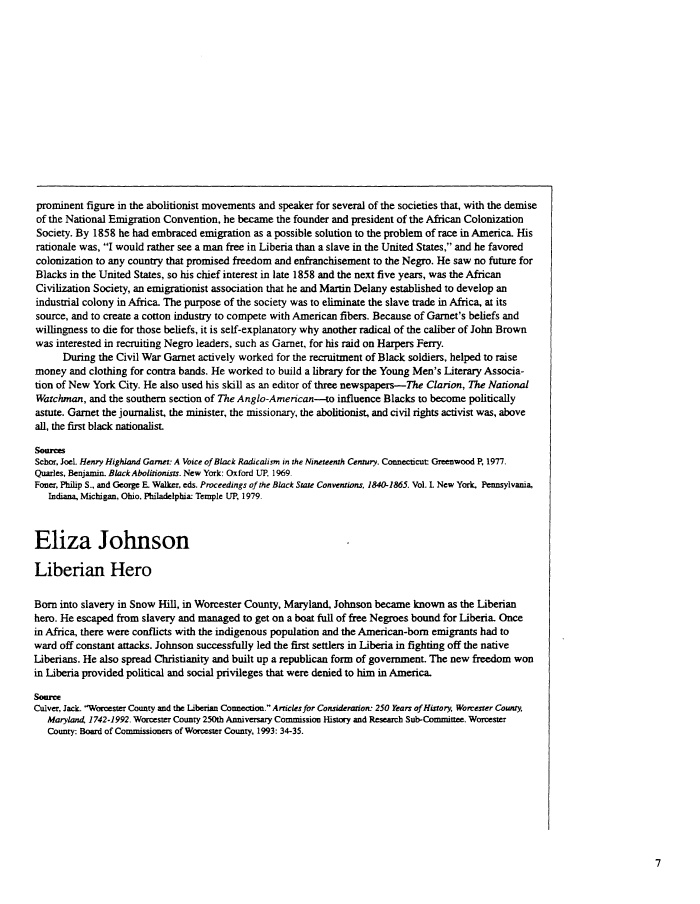 |
||||
|
TASK FORCE TO STUDY THE HISTORY AND LEGACY OF SLAVERY IN MARYLAND (Final Report) 1999/12/31 MdHR 991422 MdHR 991422, Image No: 367 Print image (69K) |
 |
||||
|
TASK FORCE TO STUDY THE HISTORY AND LEGACY OF SLAVERY IN MARYLAND (Final Report) 1999/12/31 MdHR 991422 MdHR 991422, Image No: 367 Print image (69K) |
| prominent figure in the abolitionist movements and speaker for several of the societies that, with the demise of the National Emigration Convention, he became the founder and president of the African Colonization Society. By 1858 he had embraced emigration as a possible solution to the problem of race in America. His rationale was, "I would rather see a man free in Liberia than a slave in the United States," and he favored colonization to any country that promised freedom and enfranchisement to the Negro. He saw no future for Blacks in the United States, so his chief interest in late 1858 and the next five years, was the African Civilization Society, an emigrationist association that he and Martin Delany established to develop an industrial colony in Africa. The purpose of the society was to eliminate the slave trade in Africa, at its source, and to create a cotton industry to compete with American fibers. Because of Garnet's beliefs and willingness to die for those beliefs, it is self-explanatory why another radical of the caliber of John Brown was interested in recruiting Negro leaders, such as Garnet, for his raid on Harpers Ferry. During the Civil War Garnet actively worked for the recruitment of Black soldiers, helped to raise money and clothing for contra bands. He worked to build a library for the Young Men's Literary Association of New York City. He also used his skill as an editor of three newspapers—The Clarion, The National Watchman, and the southern section of The Anglo-American—to influence Blacks to become politically astute. Garnet the journalist, the minister, the missionary, the abolitionist, and civil lights activist was, above all, the first black nationalist Sources Schor, Joel. Henry Highland Garnet: A Voice of Black Radicalism in the Nineteenth Century. Connecticut Greenwood P, 1977. Quarles, Benjamin. Black Abolitionists. New York: Oxford UP, 1969. Foner, Philip S., and George E. Walker, eds. Proceedings of the Black State Conventions, 1840-1865. Vol. I. New York, Pennsylvania, Indiana, Michigan, Ohio, Philadelphia: Temple UP, 1979. Eliza Johnson Liberian Hero Bom into slavery in Snow Hill, in Worcester County, Maryland, Johnson became known as the Liberian hero. He escaped from slavery and managed to get on a boat full of free Negroes bound for Liberia. Once in Africa, there were conflicts with the indigenous population and the American-bom emigrants had to ward off constant attacks. Johnson successfully led the first settlers in Liberia in fighting off the native LJberians. He also spread Christianity and built up a republican form of government. The new freedom won in Liberia provided political and social privileges that were denied to him in America. Source Culver, Jack. "Worcester County and the Liberian Connection." Articles for Consideration: 250 Years of History, Worcester County, Maryland, 1742-1992. Worcester County 250th Anniversary Commission History and Research Sub-Committee. Worcester County: Board of Commissioners of Worcester County, 1993: 34-35. |